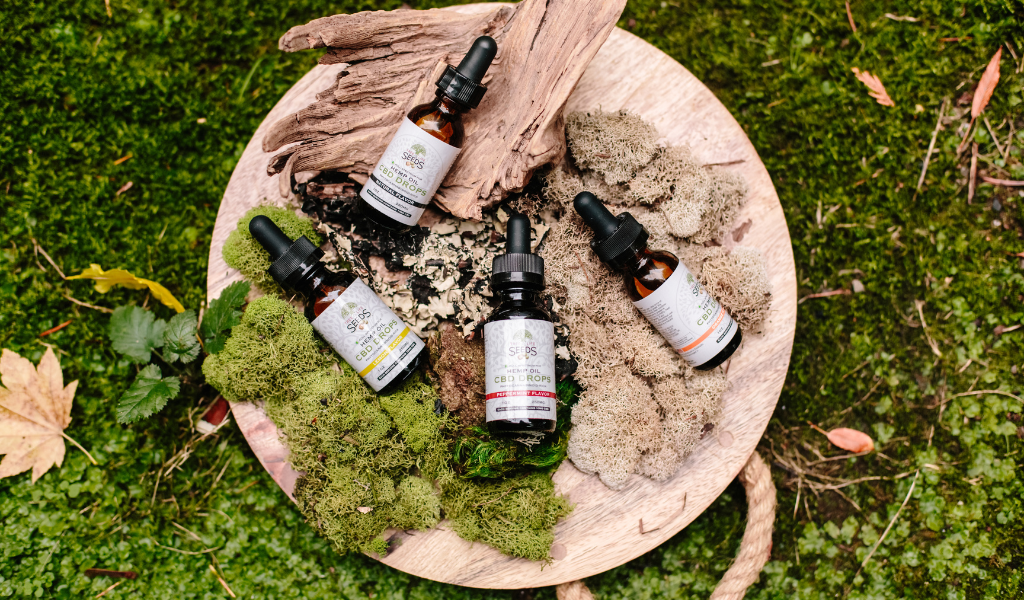Are you haunted by the constant ringing in your ears? You’re not alone – tinnitus affects nearly 15 to 20 percent of the global population. This blog post delves into how CBD, a popular natural remedy, may provide relief for this nagging issue. Get ready to tune out that unwanted noise and discover everything you need to know about using CBD for tinnitus!
Now let’s dive into the article!
- CBD is a natural remedy that may provide relief for tinnitus symptoms such as inflammation, pain, stress, and sleep disturbances.
- While there is limited research on CBD specifically for tinnitus, some studies suggest its potential benefits in managing anxiety-related insomnia and improving sleep quality.
- It’s important to note that CBD should not be considered a cure or primary treatment option for tinnitus. Expert care and advanced technology remain crucial in addressing this condition effectively.
- When using CBD for tinnitus, it’s important to consult with a healthcare professional and purchase from reputable sources to ensure safety and quality.
What is Tinnitus?

Tinnitus is a condition characterized by the perception of ringing, buzzing, or other similar sounds in the ears or head without any external auditory stimulation.
Definition and Symptoms
Tinnitus is a health problem that makes you hear noise when there is no sound. This feeling can be like buzzing, ringing, hissing, or clicking in one or both ears. It may happen all the time or come and go.
The noise can vary in pitch from a low roar to a high squeal. Some people have tinnitus so bad it hurts their lives. The loudness of the noise can change too. Tinnitus is often linked with some types of hearing loss or chronic inflammation.
Everyone’s tinnitus can feel different based on these factors.
Treatment Options for Tinnitus
Traditional approaches for treating tinnitus include medication, therapy, and sound masking techniques. However, these options have limitations in providing long-term relief. Discover how CBD may offer a promising alternative for managing tinnitus symptoms.
Traditional Approaches
Doctors use many ways to treat tinnitus.
- Ear drops or spray: These give quick relief by calming the ears.
- Hearing aids: Some folks have less noise when they hear better.
- Counseling: Talking with a pro helps manage stress and fear.
- Sound machines: Soft noise at night can help you sleep.
- Lifestyle changes: Less caffeine and more rest may cut down the buzz.
Current Limitations
Many treatments for tinnitus fall short. Pills, exercises, and devices don’t always work well. Some might even cause harm. Others only give short-term relief. Not all people get help from these treatments either.
Plus, finding out what works best for each person is hard to do. There’s still a lot we need to learn about treating tinnitus. In fact, some studies show that using CBD could make tinnitus worse in some cases!
Can CBD Help Treat Tinnitus?
CBD has shown promising potential in treating tinnitus, with research suggesting its ability to reduce inflammation and pain, promote relaxation and stress relief, and improve sleep quality.
To learn more about how CBD can help treat tinnitus, continue reading.
Understanding CBD and Its Effects
CBD, or cannabidiol, is a natural compound found in cannabis plants. It has gained popularity for its potential health benefits without the psychoactive effects of THC. CBD interacts with our body’s endocannabinoid system, which plays a role in regulating various bodily functions like pain, mood, and sleep.
Although there isn’t direct evidence that CBD can treat tinnitus, some people try it because of its possible effects on anxiety-related insomnia commonly associated with tinnitus. Animal-based research suggests that CBD may have a neutral effect on tinnitus.
Additionally, emerging research speculates that CBD could potentially help with balance and hearing issues related to tinnitus. While more studies are needed to fully understand CBD’s effects on tinnitus specifically, it may offer relief for symptoms such as sleeplessness, stress, and anxiety according to anecdotal reports and individual experiences.
Research on CBD for Tinnitus
Research on CBD for tinnitus is still limited, and there is no concrete evidence supporting its effectiveness in treating this condition. A 2015 animal study suggested that a combination of CBD and THC may even worsen tinnitus symptoms.
However, some studies have shown promising results when it comes to managing the anxiety associated with tinnitus. For instance, a study published in The Hearing Journal found that CBD was effective in reducing anxiety levels related to tinnitus.
It’s important to note that while CBD might help with stress management, it should not be considered a cure or primary treatment option for tinnitus. Expert care and advanced technology remain crucial in addressing this condition effectively.
Potential Benefits of CBD for Tinnitus

CBD for tinnitus may potentially provide benefits such as reducing inflammation and pain, promoting relaxation and stress relief, and improving sleep quality. Read on to discover more about how CBD could help alleviate symptoms of tinnitus.
Reduction of Inflammation and Pain
CBD has been found to potentially reduce inflammation and pain, which can be beneficial for individuals with tinnitus. Inflammation is the body’s natural response to injury or infection, but it can also contribute to discomfort and worsen symptoms of tinnitus.
CBD may help by interacting with receptors in the immune system and reducing inflammation in the body. Additionally, CBD has analgesic properties that may alleviate pain associated with tinnitus.
By targeting these underlying factors, CBD supplementation could provide relief from inflammation and pain related to tinnitus symptoms.
Relaxation and Stress Relief
CBD can be particularly helpful for individuals experiencing tinnitus-related stress and anxiety. Constant ringing in the ears can cause immense distress, making it difficult to relax and focus.
CBD has been shown to have calming effects on the body, helping to reduce feelings of stress and promote relaxation. By interacting with receptors in the brain, CBD can help regulate mood and alleviate anxiety symptoms related to tinnitus.
This natural remedy offers a potential solution for those seeking relief from the mental toll that tinnitus can take. Additionally, CBD may also assist with sleep troubles caused by tinnitus, allowing individuals to get much-needed rest and rejuvenation.
With its potential benefits for relaxation and stress relief, CBD shows promise as an alternative approach for managing the emotional impact of tinnitus.
Improvement in Sleep Quality
CBD has shown promising results in improving sleep quality for individuals with tinnitus. Studies have found that CBD can help promote relaxation and reduce anxiety, both of which are common factors that contribute to sleep disturbances in those with tinnitus.
In fact, research indicates that CBD has been reported to improve sleep in 66% of patients with tinnitus. This is significant because getting adequate rest is crucial for overall well-being and managing the symptoms of tinnitus effectively.
By incorporating CBD into their routine, individuals may experience better sleep and find relief from the sleep-related challenges associated with tinnitus.
Potential Risks and Safety Concerns
CBD may cause side effects such as diarrhea, dry mouth, and drowsiness in some individuals. Additionally, CBD can interact with other medications, so it’s important to consult with a healthcare professional before using CBD for tinnitus.
There is also a lack of regulation and quality control in the CBD industry, which means that not all products may contain what they claim or be free from harmful contaminants.
Side Effects and Interactions
CBD can cause side effects such as:
- Dry mouth
- Diarrhea
- Reduced appetite
- Drowsiness
- Fatigue
Lack of Regulation and Quality Control
The use of CBD for treating tinnitus is hindered by a lack of regulation and quality control. This means that the quality and effectiveness of CBD products are not well-regulated, leading to potential risks for consumers.
Independent testing has shown that CBD products are often mislabeled, with variances in the actual strength of CBD compared to what is stated on the label. This lack of standardization makes it difficult for individuals with tinnitus to find reliable and consistent CBD products that may help alleviate their symptoms.
It is important for consumers to be cautious when purchasing CBD products and ensure they are buying from reputable sources that prioritize quality control.
Choosing the Right CBD Product for Tinnitus
When selecting a CBD product for tinnitus, it is crucial to consider the different types available and the importance of purchasing from reputable sources.
Types of CBD Products
CBD products come in various forms, allowing individuals to choose the one that suits their preferences and needs. Here are some common types of CBD products:
- CBD Oil: This is one of the most popular forms of CBD. It can be taken orally by placing a few drops under the tongue for quick absorption.
- CBD Capsules: These are convenient and easy to use, as they can be swallowed like regular pills. They provide a consistent dosage of CBD.
- CBD Gummies: These tasty treats are infused with CBD and offer a discreet way to consume it. They may help reduce some of the symptoms associated with tinnitus.
- CBD Topicals: These include creams, lotions, and balms that can be applied directly to the skin. They may provide localized relief for pain or inflammation.
- CBD Vapes: Inhalation allows for rapid absorption of CBD into the bloodstream. Vaping involves using a vape pen or device that heats up the CBD oil or e-liquid for inhalation.
- CBD Edibles: These include various food and drink products infused with CBD, such as chocolates, teas, and beverages.
Importance of Purchasing From Reputable Sources
It’s important to buy CBD products from reputable sources. This ensures that you’re getting a high-quality product that is effective and safe to use. Reputable sources follow strict quality control measures, ensuring that the CBD is pure and free from harmful contaminants.
They also provide transparent information about their products, including third-party lab testing results. By purchasing from reputable sources, you can have peace of mind knowing that you’re investing in a reliable CBD product for your tinnitus treatment.
So be sure to do your research and choose trustworthy companies when buying CBD products.
How to Use CBD for Tinnitus
To use CBD for tinnitus, it is important to follow dosage guidelines and consider different methods of administration.
Dosage Guidelines
The recommended dosage of CBD for tinnitus is around 45mg per serving. It’s important to follow the dosing guidelines provided by the manufacturer or your healthcare professional. Start with a lower dose and gradually increase it if needed, while monitoring how your body responds.
Remember that individual results may vary, so it’s best to consult with a healthcare provider before starting any new treatment regimen.
Methods of Administration
There are different ways to use CBD for tinnitus. Here are some common methods:
- Sublingual: Place a few drops of CBD oil under your tongue and hold it there for about 30 seconds before swallowing.
- Capsules: Take CBD in the form of capsules or pills, just like any other supplement.
- Topical application: Apply a CBD-infused cream or lotion directly to the affected area on your body.
- Inhalation: Use a vaporizer or vape pen to inhale CBD oil or e-liquid.
- Edibles: Consume CBD in the form of gummies, chocolates, or other food products infused with CBD.
Other Complementary Approaches for Tinnitus
Sound therapy and lifestyle changes are other complementary approaches that can help manage tinnitus.
Sound Therapy
Sound therapy is a popular treatment option for tinnitus. It involves using different sounds to help mask or distract from the ringing or buzzing in the ears. This can include white noise, nature sounds, or even specially designed-tinnitus sound therapy recordings.
Sound therapy has been found to be effective in some individuals, helping to suppress their tinnitus and provide relief. One of the advantages of sound therapy is that it has minimal side effects and can be used alongside other treatments for tinnitus.
In addition to sound therapy, there are also lifestyle changes that can help manage tinnitus symptoms, such as avoiding loud noises and reducing stress levels.
Lifestyle Changes
Making lifestyle changes can help improve your experience of living with tinnitus. Here are some ways you can make positive changes in your daily life:
- Get regular exercise: Regular physical activity can help reduce stress and anxiety, which are known to worsen tinnitus symptoms.
- Practice relaxation techniques: Engaging in activities like meditation, deep breathing exercises, or yoga can help you relax and manage stress, potentially alleviating tinnitus symptoms.
- Manage your stress levels: High levels of stress can exacerbate tinnitus symptoms. Finding healthy ways to cope with stress, such as through hobbies or socializing with loved ones, may be beneficial.
- Limit exposure to loud noises: Prolonged exposure to loud noises can contribute to tinnitus. Protect your ears by wearing earplugs or earmuffs in noisy environments and turning down the volume on electronic devices.
- Maintain a healthy diet: While there is no direct evidence linking specific foods to tinnitus relief, maintaining a balanced diet rich in fruits, vegetables, and whole grains may have overall health benefits that indirectly improve your experience of living with tinnitus.
Frequently Asked Questions (FAQs)
Now let’s learn about some common questions on this topic.
1. Can CBD help with tinnitus?
CBD may help manage the symptoms of tinnitus, but it’s important to consult with a healthcare professional for personalized advice.
2. How does CBD work for tinnitus?
CBD interacts with receptors in the body’s endocannabinoid system, which may help reduce inflammation and potentially alleviate symptoms associated with tinnitus.
3. Is CBD safe to use for tinnitus?
While generally considered safe, CBD may cause side effects like drowsiness or dry mouth. It is best to talk to a doctor before using CBD for tinnitus or any other condition.
4. What is the recommended dosage of CBD for treating tinnitus?
There is no standardized dosage for using CBD to treat tinnitus. It’s important to start with a low dose and gradually increase as needed while monitoring how your body responds. A healthcare professional can provide guidance on dosing recommendations based on individual needs.
Wrapping Up
In conclusion, while CBD may offer some potential benefits for tinnitus, such as reducing inflammation and promoting relaxation, it is important to note that scientific evidence supporting its effectiveness is currently lacking.
More research is needed to fully understand the impact of CBD on tinnitus symptoms. Additionally, it’s crucial to ensure you purchase high-quality CBD products from reputable sources and consult with a healthcare professional before incorporating CBD into your treatment plan.

